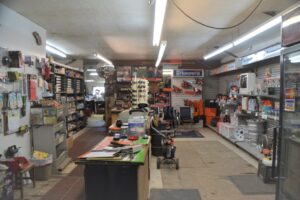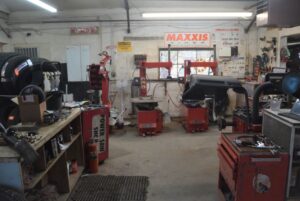Businesses change to meet consumer needs, and none more so than a business located in a rural community, where residents depend on one another for essential services. Thirty-four-year-old Larry’s Tire and Power Saw Shop at 6340 US Highway 550 in Cuba, New Mexico is a prime example.
When Larry Moreland purchased the business in 1990, it was a standalone gas station serving travelers who stopped midway between New Mexico’s largest city of Albuquerque and the Four Corners region. As the gas business slowed, Moreland closed his pumps and moved the business to another location. “Everything just evolved since then,” he said.
The business expanded by responding to the needs of rural residents who lack easy access to chain store services often found in towns and cities larger than Cuba’s village of little more than 600 people. Residents in the nearby communities of Jemez Springs, Abiquiu, and Nageezi took notice.
“We started selling more tires,” said Moreland, who increased the tire and wheel inventory while expanding repair, mounting, and balancing services to meet demand. Inventory of the equipment typically needed by rural residents was also increased.
“We’ve always sold equipment like chainsaws, but we expanded and now sell about ten to fifteen types of chainsaws and trimmers,” said Moreland, whose business is now an official distributor and repair shop for Stihl and Husqvarna.
Expanding repair services led the business to become a government contractor. “We do maintenance of outdoor power equipment,” he said. “The DOT (Department of Transportation) brings in trimmers and other outdoor equipment for us to repair.”
The store also offers chain and blade sharpening, as well as propane and bundled firewood. Larry’s Tire and Power Saw, whose employees fluctuate from five to eight people, bills itself as “your full-service hub to keep your car on the road and wood in your stove.”
When Moreland mentioned to a Cuba resident involved in economic development that he was ready to sell the business and retire, he was referred to New Mexico Manufacturing Extension Partnership (New Mexico MEP), a nonprofit organization that helps businesses transform their processes to increase profits. Denise Williams, New Mexico MEP Innovation Director for the region, worked with Moreland and his staff to refine and document procedures that would transform the company into a turnkey operation.
According to Williams, Larry’s Tires and Power Saw Shop needed documented processes, tasks, and instructions to create a turn-key manual for new owners after the sale of the business. “The new owners can then function and make changes for improvements or new options,” she said.
Moreland said Williams was thorough.
 “She looked at all the things we do and she made a notebook,” he said. “If someone was to take over, they would have the reference material to know what to do. If they needed to fix a tire, there’s information in the notebook that explains how to do that.”
“She looked at all the things we do and she made a notebook,” he said. “If someone was to take over, they would have the reference material to know what to do. If they needed to fix a tire, there’s information in the notebook that explains how to do that.”
Williams also used a technique called Value Stream Mapping to document and improve procedures for production and administration.
Some of the production forms suggested by Williams are not new, Moreland said, adding that “we’re using forms like work order forms to do the repairs.” The shop now uses forms for repair, sales, warranty processing, troubleshooting, workflow, and government payments.
Before health issues forced Moreland’s wife Leda to retire, she worked in the administrative side of the business “That hurt us,” Moreland said about his wife’s retirement. But things have improved since Williams started working with the business. “Now we’ve got a better handle on the paperwork,” he said.
And more. The company has increased cash flow and profitability by 30 percent, allowing it to reinvest in building, IT, and bookkeeping improvements.
A dry sense of humor can mask Moreland’s appreciation for the work done by New Mexico MEP’s Denise Williams, but his words are sincere. “She really gets involved in her work,” he said. “As far as doing something to help us get the business ready to sell, she’s been very helpful. She’s a good person.”
Moreland, who intends to stay and volunteer in the community when he retires, believes a new owner can easily step in. “We’re getting everything lined up so everything is ready to go to a bank to lend someone money to buy the business,” he said. “We’ve made it more of a business.”

